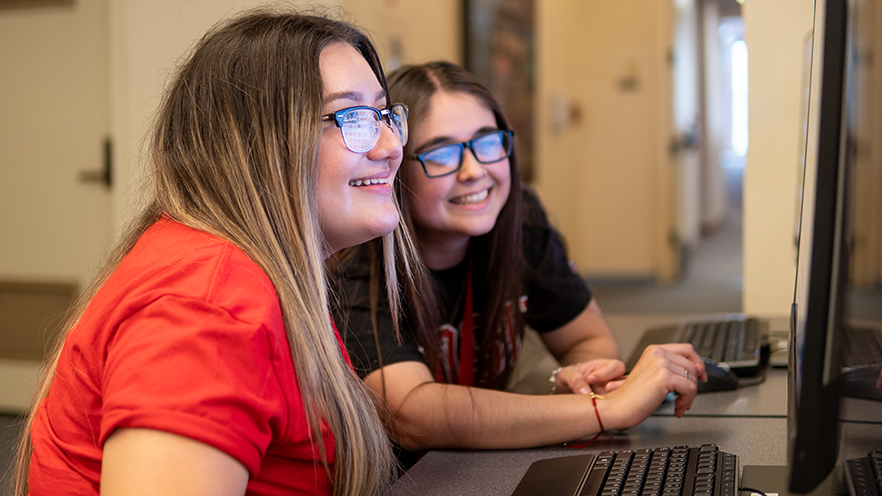First Year Seminar incorporates AI, Adobe Suite tools to drive student success
In a new development for SDSU’s First Year Seminar, incoming students will earn the SDSU AAAI Microcredential and use Adobe Express to support their success in college and in their future careers.

Technology, especially the advent of artificial intelligence, is rapidly changing the way people learn, work and communicate, and San Diego State University wants every student to be ready for this new reality.
This fall, and for the first time, students in the First Year Seminar (FYS) curriculum are learning about AI toward earning the SDSU AAAI Micro-Credential Program and using Adobe Express, an intuitive tool for creating webpages, videos and graphics.
The more than 4,000 students across more than 228 course sections are relying on the tools for a semester-long keystone project, all designed to train them in the appropriate and responsible use of AI.
“AI isn’t just a trendy tool, but a general purpose technology, like the steam engine, silicon chip and the Internet, that will fundamentally impact how we develop as individuals and interact with one another and our environment,” said Stephen Schellenberg, an earth and environmental sciences professor who served as the First Year Seminar’s inaugural director.
Schellenberg, who is now a faculty fellow for the program, co-developed the project with: Rebeca Navarrete, the new First Year Seminar Director and key partner in developing the Life Tree project; Stuart Voytilla, a lecturer in the School of Theatre, Television, and Film and faculty lead of the SDSU Story Lab; and staff at Adobe Creative Campus through one of the first-ever Adobe Creative Campus Innovator grants.
All told, nine universities nationwide were recognized as Adobe Creative Campus Innovators, which Adobe says “are setting new standards for engaging students through inclusive, scalable programs that foster creative confidence, career readiness and standout visual portfolios that showcase the skills employers need.”
“AI can open doors to creativity and innovation, but we need to understand its risks and limitations and learn how to use it responsibly and appropriately,” Navarrete said.
“By embedding AI training and conversations into the seminar curriculum, we are helping students build confidence and integrity in their work and embrace an intentional and metacognitive approach to AI usage,” she also said.
Scaling up
At scale, the project will train more than 75 instructors in the AI-enhanced Adobe Express tools to ultimately educate over 5,700 students annually in the seminar.
As part of the class, students will complete a semester-long “Life Tree” activity exploring their personal roots, core values and future aspirations, including potential career paths.
Along with this creative element, the class will introduce students to ethical AI practices, teaching what it means to use AI responsibly and why transparency and fairness matter in the digital world.
“This experience is about more than just completing an assignment and project. It’s an opportunity for students to tell their story in a creative way, build confidence with digital tools and prepare for success in college and in their future careers—all while learning to apply AI skills in a responsible way,” said Sean Hauze, chief operating officer for SDSU’s Information Technology Division and the project’s executive sponsor.
Student mentoring
A Creative Influencer and Peer Mentorship Network is also being created to foster community-based learning, with student AI coaches, faculty and staff being recruited from those who have completed the microcredential. Facilitated by the SDSU Story Lab, which Voytilla is leading, this network will support storytelling workshops, campus showcases and peer support initiatives.
Students will have the opportunity to build upon the skills developed for their project to earn a digital Adobe GenAI badge, which highlights skills in communication, technology and creativity that employers value.
After earning the badge, students will be encouraged to pursue Adobe’s Digital Academy credentials, which are aligned with the National Association of Colleges and Employers career readiness competencies related to critical thinking, communication, professionalism and leadership.
“Success in college, and life in general, requires adaptability,” Hauze said. “This seminar experience shows students how to use AI tools to tell their story, solve problems and prepare for careers, including jobs that do not even exist yet.”
To date, more than 6,600 students, faculty and staff have participated in the AAAI Micro-credential Program, which SDSU has made accessible to campuses across the California State University students. The university community is encouraged to complete the program, which offers information and training on the ethical adoption of AI tools.
“AI isn’t just a trendy tool, but a general purpose technology, like the steam engine, silicon chip and the Internet, that will fundamentally impact how we develop as individuals and interact with one another and our environment,”



